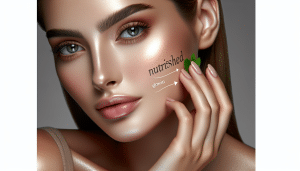Unexpected Ways Hydration Transforms Your Skin
Ella Knight October 27, 2025
Discover the surprising connection between hydration and radiant skin within this in-depth guide. Explore how drinking water supports your natural beauty routine, helps reduce dullness, and may even boost the effects of other skincare practices.
The Science Linking Hydration and Skin Vitality
Hydration does much more than quench thirst. It has a profound impact on the appearance and resilience of your skin. The body consists largely of water, and the skin, being its largest organ, requires adequate hydration to function optimally. Daily water intake can influence how plump, firm, and radiant skin appears. Cells rely on water to flush out toxins and transport nutrients, so an adequate supply can make a visible difference. Research shows that even slight dehydration can cause skin to look duller and feel rougher than usual. Habitually low water intake may even make fine lines appear more pronounced due to decreased skin elasticity.
Your skin acts as a protective barrier, safeguarding you from environmental stressors and pollutants. The outermost layer, called the stratum corneum, is composed partly of natural oils and water. When hydration levels dip, this barrier weakens, resulting in dryness, flakiness, and sometimes even irritation. Enhanced moisture supports the repair of damage and smooths the outer texture. For individuals who experience redness or sensitivity, addressing hydration offers a simple method to help maintain skin balance. Dermatologists note that hydrated skin is generally less prone to inflammation and feels more comfortable under various environmental conditions (https://www.ncbi.nlm.nih.gov/pmc/articles/PMC6017965/).
Studies suggest hydration’s effect goes beyond the surface. Proper fluid balance supports circulation, which in turn ensures cells receive the nutrients they need to thrive. This ongoing nutrient delivery process aids natural collagen production, a key element in supporting youthful skin structure. Many wellness guides recommend monitoring both external and internal hydration for comprehensive beauty support. In the pursuit of healthy skin, focusing on water intake can offer a simple, foundational boost that complements advanced products and regimens (https://www.ncbi.nlm.nih.gov/pmc/articles/PMC4529263/).
Drinking Water Versus Topical Moisturizers
Many wonder if drinking water or applying topical skin treatments produces the greater benefit. Both approaches matter, but they serve unique roles. Consumed water hydrates cells from the inside, helping build the skin’s resilience and flexibility. This approach addresses dehydration-related issues that no cream can reach. However, water alone may not instantly solve dryness caused by environmental factors or disrupted skin barriers. Instead, water complements topical moisturizers, which deliver direct hydration and help seal in moisture. Applying a cream or lotion after cleansing traps water within the skin, creating an effective defense against moisture loss.
It’s helpful to pair regular internal hydration with products suited for your individual skin type. For instance, gel-based formulas might suit those with oily skin, while thicker creams are better for dry, mature complexions. Sometimes serums containing hyaluronic acid or glycerin draw water into the outer layers, enhancing benefits achieved through drinking fluids. This layered approach, sometimes referred to as ‘moisture sandwiching,’ offers both immediate relief and longer-term transformation. Building a routine that mixes proactive drinking habits with smart topical applications can be a winning strategy for visible radiance and comfort.
Experts suggest that optimal outcomes often depend on climate, lifestyle, and genetics. Excessive sun exposure, heating systems, or air conditioning can strip away moisture regardless of water intake. In such environments, combining topical barrier repair with internal hydration is critical. Some individuals notice quick improvements in skin texture within a week of increased water consumption, while others require a sustained routine for gradual, meaningful changes (https://www.aad.org/public/diseases/a-z/skin-care-water).
The Subtle Signs of Dehydrated Skin
Recognizing the signals of dehydration isn’t always straightforward. Symptoms can range from obvious dryness and scaling to less apparent clues like increased sensitivity, tightness after cleansing, or a lackluster tone. Fine lines might suddenly seem more visible, particularly on the forehead or around the eyes. Some individuals describe their skin as feeling rough or papery to the touch. When these symptoms persist, it’s often a reflection of low fluid levels in the skin layers. Environmental factors such as windy weather or excessive indoor heating can exacerbate the problem even further.
Beyond the visible indicators, dehydrated skin often reacts more strongly to cosmetics or certain cleansers. You might notice stinging or redness after applying products that previously caused no irritation. The reason: compromised skin loses its ability to shield against external elements, resulting in a greater urge to itch or rub the face. This discomfort isn’t just superficial—it indicates that the skin barrier is struggling to maintain its essential moisture balance. Wellness advocates sometimes recommend a gentle, fragrance-free moisturizer alongside gradual increases in daily water intake to help calm these reactions.
Not all dry-feeling skin is technically dry in dermatological terms. ‘Dehydrated’ skin lacks water, while ‘dry’ skin lacks oil. Anyone, regardless of skin type, can experience dehydration. This nuance makes it worthwhile to assess daily hydration habits if skin suddenly appears dull or flaky. Tuning into subtle shifts—such as makeup not sitting evenly or unexpected rough patches—may point to a need for increased fluid intake. Health professionals emphasize that attending to hydration supports long-term barrier function and comfort (https://www.aad.org/public/diseases/a-z/skin-care-water).
How Diet and Hydration Influence Skin Glow
Few beauty tips are as universal as the recommendation to drink plenty of water and nourish your body from within. Water facilitates digestion and nutrient absorption, clearing away waste that can build up and manifest in the skin as blemishes or dullness. A diet rich in fruits and vegetables—think cucumbers, watermelon, and leafy greens—delivers both water and micronutrients that amplify hydration’s impact. Nutritionists suggest that combining hydration with foods high in vitamins C and E can help support natural glow, as these nutrients play a role in protecting cells from oxidative stress.
Beyond eating hydrating produce, essential fatty acids from sources like nuts, seeds, and oily fish create another layer of defense for the skin. These fats help lock moisture in, providing a supple feel and reducing visible roughness. Incorporating hydration-friendly drinks such as herbal teas also contributes, while minimizing excess caffeine or sugar is advised. These latter ingredients may pull water away from the skin, counteracting the benefits of hydration. Wellness guides widely promote the idea that what you eat and drink appears on your skin—in both positive and negative ways (https://www.hsph.harvard.edu/nutritionsource/water/).
Some individuals notice greater vibrancy and fewer breakouts after improving both diet and hydration. Long-term healthy habits often replace quick fixes by supporting skin strength over time. Simple steps such as carrying a refillable water bottle, snacking on hydrating foods, or creating a flexible meal plan are practical solutions that fit any routine. Experts caution against extreme water consumption, however; moderation is key. For most adults, drinking when thirsty and choosing water-rich snacks suffice for natural glow and wellness benefits.
External Factors That Impact Hydration Levels
While hydration habits play a central role, several outside influences can affect skin’s moisture balance. Environmental conditions—like humidity, wind, and sun exposure—either accelerate water loss or promote retention. Living in cold, dry climates often increases the risk of dehydration, so a tailored approach to hydration and skincare during winter months is wise. Similarly, time spent in chlorinated pools or saltwater can impact skin’s ability to hold moisture. Applying moisturizer right after bathing, when skin is still damp, can help lock in hydration and minimize these effects.
Personal routine matters as well. Long, hot showers may feel relaxing, but they can strip oils needed to prevent water escape. Gentle cleansing routines and avoiding harsh soaps can support the skin’s natural defenses. Even indoor factors, like air conditioning or central heating, affect skin hydration more than many realize. Portable humidifiers or opening a window for short periods help restore a healthier moisture balance. Many recommend reassessing both household habits and environmental exposure alongside daily water intake for optimal outcomes (https://www.cdc.gov/healthywater/drinking/nutrition/index.html).
Even lifestyle habits—travel, exercise, or occupation—can interfere with hydration. Active individuals may require increased water intake, especially when engaging in intense physical activities. For those frequently flying or commuting, compact skincare tools like facial mists or hydrating sprays can provide convenient on-the-go support. By taking stock of both controllable and uncontrollable external factors, it becomes easier to navigate periods when skin feels less resilient or refreshed.
Myths and Facts About Water and Skin Appearance
The topic of water’s influence on skin is the subject of persistent myths. Some believe that drinking more water leads to instantly flawless skin. While adequate hydration is crucial, no amount will cure all skin concerns overnight. Genetics, hormones, lifestyle, and environment also contribute to how your skin looks and feels. However, scientific studies confirm that hydration forms a foundational pillar for supporting barrier function and radiance. When paired with good nutrition, sleep, and targeted skincare, benefits compound over time.
Another misconception is that only those with visibly dry or mature skin need to worry about hydration. In truth, even oily or combination skin types can experience dehydration, presenting as shiny yet uncomfortably tight skin. Dermatologists recommend assessing hydration on a daily basis—paying close attention to subtle shifts rather than only treating visible dryness. Skin needs evolve throughout the seasons and even during life’s varied stages. A flexible, holistic wellness approach can help address these changing needs without over-relying on any single solution.
Lastly, people often reach for sports drinks or flavored waters, thinking these provide the same benefits as plain water. While some fortified beverages offer supplemental electrolytes, they may contain sugar or artificial additives that detract from skin’s health. The guidance from health researchers remains consistent: water and foods naturally high in fluid are better first choices for supporting skin’s barrier and youthfulness (https://pubmed.ncbi.nlm.nih.gov/29614007/).
References
1. Palma, L., et al. (2015). The Importance of Water for Maintaining Skin Health. Retrieved from https://www.ncbi.nlm.nih.gov/pmc/articles/PMC4529263/
2. Draelos, Z. D. (2018). The Science Behind Hydration and Moisturizers. Retrieved from https://www.ncbi.nlm.nih.gov/pmc/articles/PMC6017965/
3. American Academy of Dermatology. (n.d.). Water and Skin. Retrieved from https://www.aad.org/public/diseases/a-z/skin-care-water
4. Harvard T.H. Chan School of Public Health. (n.d.). The Nutrition Source: Water. Retrieved from https://www.hsph.harvard.edu/nutritionsource/water/
5. Centers for Disease Control and Prevention. (n.d.). Drinking Water, Nutrition, and Health. Retrieved from https://www.cdc.gov/healthywater/drinking/nutrition/index.html
6. Kantor, E. D., Chan, A. T., & Giovannucci, E. L. (2018). Hydration and Health: A Review. Retrieved from https://pubmed.ncbi.nlm.nih.gov/29614007/







